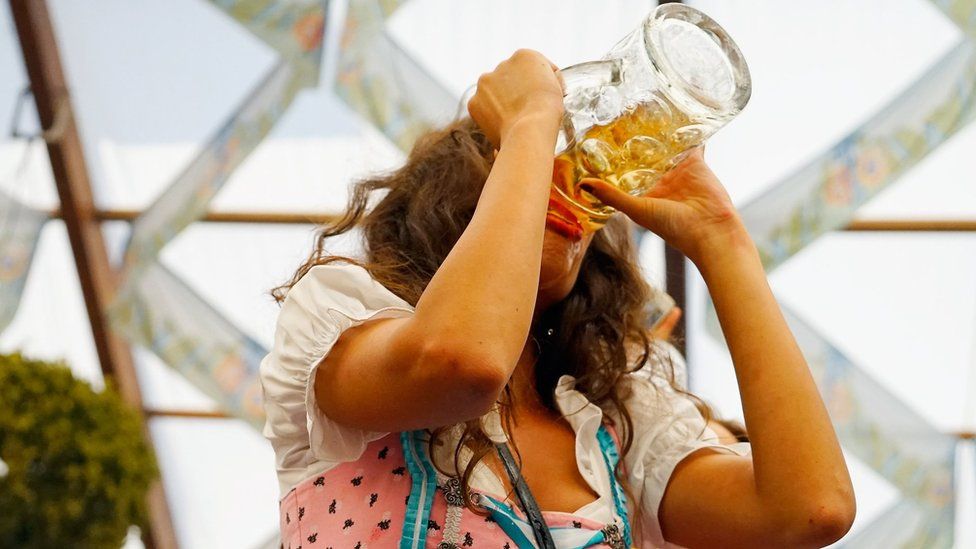German beer: 500 years of 'Reinheitsgebot' rules
- Published

This weekend marks 500 years since the Duke of Bavaria introduced the "Reinheitsgebot" or purity law - strict rules controlling what can go into beer.
And beer lovers across Germany will be celebrating at events (read: subsidised drinking opportunities) to mark the anniversary of the famous food law.
As Chancellor Angela Merkel partakes of an obligatory Pils with German brewers in the Bavarian town of Ingolstadt, the BBC's Claudia Allen takes a look at the Reinheitsgebot, and what it means for German beer today.
Why was the purity law introduced?
The decree known as the Reinheitsgebot, issued in Ingolstadt in 1516, had three aims: to protect drinkers from high prices; to ban the use of wheat in beer so more bread could be made; and to stop unscrupulous brewers from adding dubious toxic and even hallucinogenic ingredients as preservatives or flavourings.
They included herbs and spices such as rosemary and caraway, henbane, thorn-apple, wood shavings, roots, soot or even pitch, according to the German Brewers' Association (DBB).
Duke Wilhelm IV's beer purity regulation of 1516, which was preceded by earlier rules on beer production, was gradually implemented in other parts of southern Germany. It eventually became law in the north and thus the whole country in 1906.
The DBB claims that the Reinheitsgebot is the oldest currently valid consumer protection law in the world.
What can go into German beer?
The original law limited ingredients to just barley, hops and water.
The exact role of yeast in alcoholic fermentation was not understood at the time and it was only later that brewers were able to add the micro-organism as a specific ingredient.
The production of wheat beers remained limited in Bavaria for centuries but is now allowed.
So the law now states that malted grains, hops, water and yeast may be used - but nothing else.
What about EU regulations?
Beers brewed according to the Reinheitsgebot have special status under European Union laws as a protected traditional foodstuff.
Read more:
However European law means that the German brewing industry has had to accept that beers brewed elsewhere not in accordance with the Reinheitsgebot can be sold in the country.
Is German beer really all that great?
Germany exports 1.5 billion litres of beer every year, and the country is pretty proud of its beer and the purity law.
But not all German brewers are happy with the restrictions, as Spiegel Online reports; some say they lead to uniformity and encourage industrial-scale production rather than innovation in the industry.
Oliver Struempfel carried 27 one-litre jugs of beer for 40 metres, as Tim Allman reports
The Munich Oktoberfest is the world's largest beer festival, bringing millions to the Bavarian capital every autumn.
I need a gluten-free diet - can I still enjoy German beer?
Most gluten-free beers use maize or rice instead of barley or wheat - these are free of the troublesome gluten but not allowed under the German Reinheitsgebot.
But there is good news for beer-loving coeliacs - a new beer which the manufacturers claim (in German) is the first gluten-free beer brewed under the Reinheitsgebot has just been launched.
It uses a new Australian barley which is low in gluten, but the beer is only available in Germany at the moment.
What if I'm teetotal/pregnant/driving?
Fear not, German brewers are able to make alcohol-free beer using just the four ingredients. Either alcohol production is inhibited during the fermentation process, or the alcohol is subsequently removed.
Can I brew my own beer?
Yes. In Germany home brewers producing up to 200 litres a year, and not selling it, do not have to pay tax on their beer, and do not have to keep to the purity regulations. But go easy on the henbane.
- Published29 September 2014
- Published30 January 2014
- Published8 September 2014